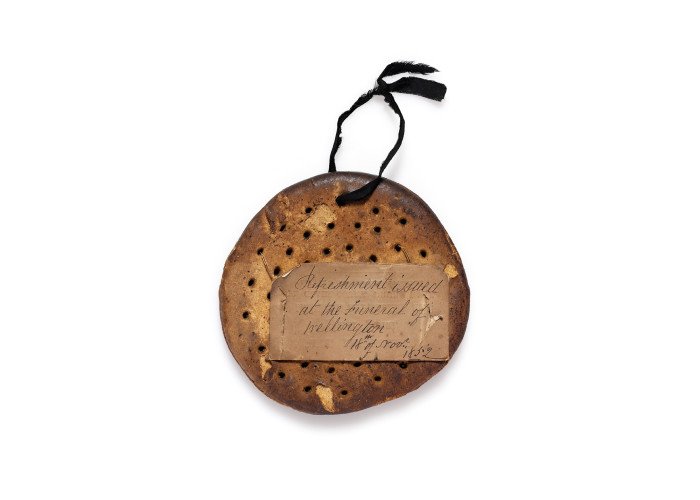Bread Biscuit
This hard bread biscuit is over 150 years old. It was given to one of the soldiers who attended the funeral of the Duke of Wellington. These soldiers marched alongside the funeral procession through London, and one man kept his rations for the day as a souvenir.
This is a fascinating relic, not only as a ‘souvenir’ of the great Duke’s funeral on 14 September 1852, but also as a reminder of the basic food eaten by the British Army on campaign during the Revolutionary and Napoleonic Wars (1792-1815). The main foods issued to the British Army were bread, in one form or another, fresh or salt beef or pork, small beer, wine, spirits, pease (old word for dried peas), rice and other vegetables, with oatmeal, raisins, cheese and butter.
The basic daily ration for a soldier in the wars against France was a pound of bread biscuit and a pound of fresh or salt beef or pork. These items were kept in a bread bag slung over a soldier’s shoulder. Soldiers ate in ‘messes’ and could either chew the tough biscuit or pound it up to mix into ‘stirrabout’, a soup or stew made of various rations or extra items purchased.
This biscuit (sometimes called ‘bisket’) was a round, square or octagonal shaped hard object (weighing about 3.2 ounces) made of wheat flour and water. Salt was not included as it attracted moisture and subsequent infestation by a variety of insects. A large amount of the corn production was from East Anglia or imported from the Baltic States. Flour quality varied in grading, and sometimes barley flour might be added when wheat harvests were poor. Scandals over alleged adulteration of flour with alum or chalk emerged over the years. A biscuit such as this one was called ‘hard tack’ (as opposed to ‘soft tack’, i.e. soft leavened bread as we know it).
Salted meat and biscuits were packed into barrels made by coopers in or near the victualing yards where provisions were manufactured. At home, commissaries and sutlers provided food supplies. Abroad, contractors were involved supplying the Commissariat, which used mule trains and bullock carts to move the huge amounts of food around.
The soldier on the funeral route would have been given a day’s ration of these biscuits to sustain him.
-
Curatorial info
- Originating Museum: Stratfield Saye House
- Production Date: 1852
- Material: Food biscuit
- Size: 15cm diameter
-
Use this image
You can download and use the high resolution image for use in a non-profit environment such as a school or college, but please take note of the license type and rights holder information below
- Rights Holder: Stratfield Saye Preservation Trust
- License Type: Creative Commons
Find it here
This object is in the collection of Stratfield Saye







